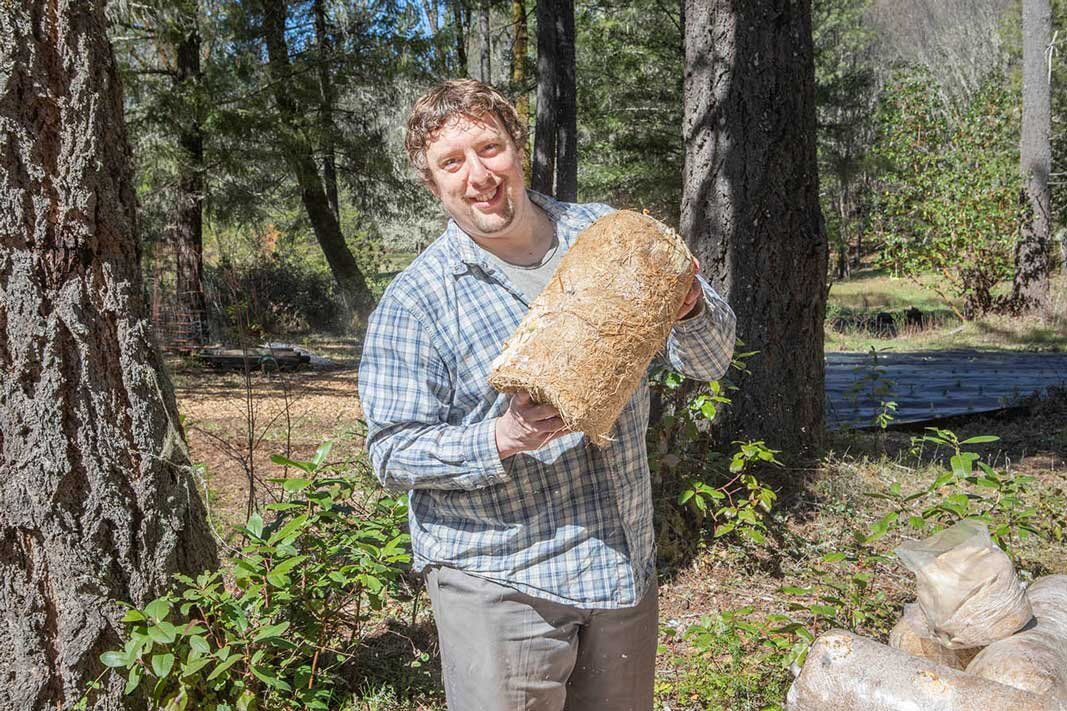Mulligan Gardens

by Michael Caine, with updated information from the Mulligan family
Reprinted with permission of the Willits Weekly.
Their 5,350-mile journey began in Den Helder, the Netherlands, where, as youngsters, Laytonville farmers Michiel (Mic) and Ben Rueb partially grew up at their grandmother’s homestead. At a young age, they became involved in agriculture on neighboring farms, where they worked the tulip, potato, and onion fields.
Now the pair, along with their mother, father, and younger brother, reside on twenty acres of arable land called Mulligan Gardens. The acreage includes three good-sized ponds (soon to have a number of ducks to go with their chorus of croaking frogs), several residences and work buildings, a propagation greenhouse, a thriving mushroom business, a bamboo business (run by youngest brother Denzel), and the gardens from which the complex derives its name.
The gardens are mostly the responsibility of Michiel and consist of a kitchen garden, where a large part of the vegetables for the family’s consumption are grown; three market gardens; a large tract for publicly-purchased seasonal veggies that are sold primarily at several Mendocino County farmers markets; and a sizeable herb garden. The herbs have just been planted and will take anywhere from two to four years to reach the bushy hedge stage, but they will be harvested continually while they reach maturity.
“This is one of our market gardens,” explained Michiel. “Everything that ends up at farmers markets comes from here. Right now we have tomatoes, carrots, onions, beets, cucumber, kale, and much, much more. I’m working hard to keep up with harvesting all the summer abundance, while planning and planting ahead for a winter bounty that will hold us over into spring.”
Their farm utilizes several innovations which increase their yield, use fewer materials, and protect the environment. They create their own compost out of used mushroom “logs” (which contain straw and other organic material), Biochar (made on site in a homemade charcoal kiln), manure from their own and neighboring farms, and other organic materials from the property. They use their homemade compost to make a compost tea, which is delivered to the various gardens through a clever irrigation system controlled from a central distribution manifold.
Most of their customers at farmers markets know Mulligan Gardens by the delectable and sizeable blue oyster mushrooms they offer. The production of these tasty delicacies is the responsibility of brother Ben, who has been working the past two-and-a-half years to perfect their production. He has had to do much study and experimentation to get the fungi to grow in the most efficient manner, creating and constructing many of the tools and equipment needed for the business. “You can’t order this stuff on Amazon,” he quips.
Mulligan Gardens
Ben, who is a classical pianist in his off-time, gave us a tour of his operation. First, he demonstrated how the “poly tubing logs,” in which the mushrooms will grow, are created. He recently received a Good Farm Fund Grant, allowing him to acquire a “bale chopper,” which slices a straw bale to a fine mulch in which the mushrooms will be grown. This has cut many hours off his production time. Then the grain spawn is added, as well as other additives such as gypsum. This mixture is stuffed into approximately four-foot poly tubing on a table designed and constructed by Ben. Holes are made in the sides of the poly tubing logs to allow for the gas exchange of oxygen and carbon dioxide. They are then hung in a warm place for the mycelium (the roots) to begin to spread.
Eventually, the logs are transferred to the climate-controlled basement, where the mushrooms grow through the poly tubing gas exchange holes. In ten days, the mushrooms will reach maturity and are ready to be harvested. This is a very simplified description of the process, which takes significant care, knowledge, and planning to produce the 80 or so pounds that it yields each week.
The brothers have big plans for next season. They would like to see an expansion of their orchard, honey bees, and pastured lifestock including pigs and sheep. Climate controlled shipping containers would increase blue oyster mushroom production and also allow them to grow more varieties such as shiitake, king oyster, yellow oyster, lions mane, and chestnut mushrooms. A mushroom propagation lab would allow them to make their own grain spawn, agar cultures, and liquid cultures. They are planning to sell a variety of herb bends and seasonings, as well as mushroom jerky, to supermarkets and at farmers markets next season. The jerky comes in four flavors: Barbecue, Teriyaki, Thai Peanut, and Flaming Hot.
You can find Mulligan Gardens at the following farmers markets: Laytonville on Monday, Fort Bragg on Wednesday, Bell Springs and Willits on Thursday, and Covelo on Friday. They also sell their produce and mushrooms to local supermarkets and restaurants, although, Ben added, ”The restaurant sales have gone down due to the COVID-19 crisis. The farmers market sales have gone up significantly.”
It is encouraging to observe the innovations and concern for the environment, as well as their ability to utilize available materials and methods, as the Mulligans create this growing business. With this creative and can-do attitude, they will continue to break new ground and feed their community for many years to come.
Follow Mulligan Gardens at www.instagram.com/mulligan.gardens and www.instagram.com/bluestek. You can also them at the farmers markets in Fort Bragg, Willits, and Covelo.
This article was reprinted with permission from the Willits Weekly. Originally printed in the spring of 2020. Updates and edits have been applied.

